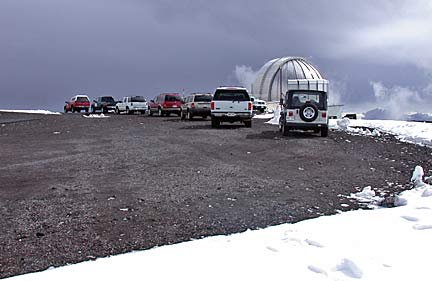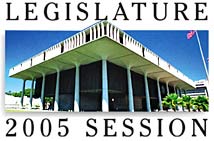
|
Lawmakers defer
pro-astronomy bill
Preservationists accuse the backers
of trying to undermine regulation
Despite support from business leaders, a bill that would make it easier to develop observatories and astronomy facilities at the summit of Mauna Kea appears dead.
|
|
Hawaiian groups and environmentalists opposed the House bill, saying it would undermine existing public processes that regulate the development of telescopes atop the ecologically and culturally sensitive Big Island volcano.
"This was a despicable attempt to sidestep and circumvent the public process and ongoing litigation by weakening protection options for the sacred summit of Mauna Kea," said Cha Smith, executive director of KAHEA, an environmental group.
Under the measure, the Department of Land and Natural Resources would designate areas as astronomy resource subzones within conservation land-use districts. It would also provide for mediation in lieu of contested cases.
Ted Liu, director of the state Department of Business, Economic Development and Tourism, and other supports said the bill would make Hawaii's world-class observatories even better.
Liu said the bill helps "clarify and streamline the procedures required to build and operate new scientific facilities ... with an emphasis on providing a process for effectively addressing community concerns.
"We believe it makes an important contribution, securing Hawaii's future as a leader in astronomical research as well as ensuring that our citizens will play a major role in both determining and realizing that future," Liu said.
Mauna Kea houses 13 major telescopes that represent 12 nations and bring in nearly $62 million a year in revenues to the state.
The summit is on ceded lands -- the crown or public lands successively ceded to the Territory of Hawaii and then to the state in 1959. They make up about 95 percent of state-owned lands.
Mark McGuffie, executive director of the Hawaii Island Economic Development Board, said the current review process needs to change because it is "unwieldy and unreasonable and tends to discourage astronomy investments."
"We fear that maintaining the present process will stifle the natural progression of improvements, and alternative sites outside of the state of Hawaii may become more attractive," he said.
The Office of Hawaiian Affairs said it "strongly opposed" the bill, noting that Mauna Kea is home to several endangered species.
"We at OHA feel that this bill attempts to open the floodgates for more observatories on Mauna Kea, and we feel Mauna Kea is one of the most sacred of Hawaiian places and that it has only so much capacity for economic development," the office said in a statement presented to lawmakers.
The bill was heard by the House Committees on Water, Land and Ocean Resources, and Higher Education.
www.state.hi.us/dlnr/
[News] [Business] [Features] [Sports] [Editorial] [Do It Electric!]
[Classified Ads] [Search] [Subscribe] [Info] [Letter to Editor]
[Feedback]

